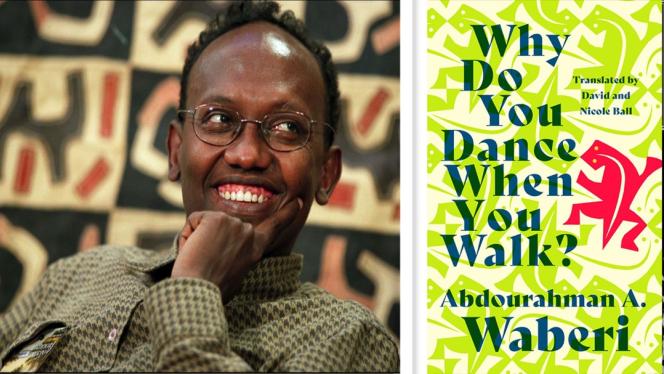Tuesday 22 October 2024
Searching for identity

I’ll tell you about the shifting desert around Djibouti
–Abdourahman Waberi
"Dad, why don’t you drive, cycle, skate or even ski?” Abdourahman Waberi’s daughter asked him one morning as they were on the way to her school in Paris’ 9th arrondissement. The reason was obvious as Waberi had a disability that discernibly impacted the way he walked, but she was laying the groundwork for a more prying question. “Kids are always curious and can be quite tough sometimes and that morning she bluntly asked me, ‘dad why do you dance when you walk?’”
“I was only 7 years old when I became a victim of polio you know,” says Waberi. Successful vaccination programs have made it a rare disease in the world’s wealthier countries but a brush with it can have a lifelong impact including permanent damage to muscles and nerves. “I’ve only recently started speaking about this,” he admits, having lived much of his life with a disability because of it. Though most people recover, he now walks with a limp causing him to lean sharply to the right with every step. “My most recent novel came out of this discussion”, he continues, Why Do You Dance When You Walk. “It’s a kind of roman-à-clef.”
In the book he traces his roots back to parched streets of Djibouti City, giving a feeling for everything from its dust, clutter, and shanty towns to its colorful characters. But crucially, he recounts how he contracted polio, living with its consequences and how that formed him into a writer. “I wasn’t going to play football like the rest of the kids growing up,” he laughs, speaking to me over the phone from Washington DC where he teaches writing at George Washington University. “I mean I loved football, but I couldn’t run like the other kids and as we got older I hung up my boots, becoming more contemplative. My disability I guess made me a more reflective person.”
Born in 1965, Waberi initially started off as a poet, before trying his hand at fiction. His early novels focussed on giving the world some of its first literary portraits of a country most know very little about. Tucked neatly into the small crevice straddling Africa’s eastern seaboard, it is separated from the Arabian peninsula by a 20 mile waterway called Bab el-Mandeb. “You can actually see Yemen,” he says. The country is a former French colony, with a population of just under a million.
But “… what was Djibouti originally?” Waberi’s protagonist asks himself rhetorically in his novel The Passage of Tears. “A handful of magic little islands over which history rose and swirled like a hurricane for centuries?” As his unresolved answer suggests, making sense of the country isn’t simple, though his books are probably a good place to start. The Passage of Tears follows the lives of two brothers; one who works for a Western intelligence company returning home for a job and his imprisoned vengeful twin who is seduced by religious radicalism, but eventually finds peace in the writings of Jewish-German philosopher Walter Benjamin.
The tale, whose title comes from the nickname for the Bab el-Mandeb waterway, showcases and juxtaposes some of the tensions that characterize modern Djibouti; a small state with a kleptocratic and Westernized elite who aspire to make the country Africa’s Singapore, ruling a largely poor, and marginalized population that hasn’t benefited from the significant changes the country has undergone since independence in 1977. Waberi tells me he wanted to “maximize the drama,” which is why he tracked the impact of modernization, faith, and the search for identity in one family. Though he stresses that Djibouti is of course much more complex, “the country is lost somewhere between these two characters.”
Though conquerors have left their traces for centuries—from the Ottomans to the French— today it is an eclectic Francophone blend of Somali, Afar, and Arab. Djibouti leverages its location to provide the world’s great powers with prime real estate for their military and naval bases and 30 percent of global shipping passes through the Bab-el Mandeb waterway. Waberi’s early trilogy—The Land without Shadow, The Nomadic Notebook, Balbala—provides vivid and candid portrayals of Djibouti through the eyes of a native, from the khat chewers lounging around its sultry streets, its myths and legends, the wandering nomads and its uncomfortable relationship with its old colonial power. “I felt that I had a debt to my homeland but I also wanted to give a voice to my country,” he says.
In the early 1990s, Djibouti had no universities, recalls Waberi, so those who aspired to an advanced education had to venture to France. Already showing signs of promise as a young man, people in his neighborhood paid Waberi in candy to write love letters and complete their job applications. He was among the early cohorts of youngsters who embarked on the journey to France leaving in 1985 with “a sense of mission” and postcolonial enthusiasm, he says, and aiming to return to their homeland as skilled professionals. While many of his contemporaries eventually found their way back to Djibouti as heirs apparent, taking their place in the country’s elite, Waberi’s trajectory veered down a different path. “I didn’t really have ambitions other than to teach and write, and thought briefly about being a journalist, but Djibouti isn’t the easiest place to do that job,” he laughed. He’s lived and worked abroad since he left.
In his nascent days as a writer Waberi struggled with the country’s authoritarian government. He says he took inspiration from the experience of the well-known Somali author Nureddin Farah (he also wrote his advanced masters thesis on Farah), who faced similar impediments on what he could write about in neighboring Somalia which was under military rule until the early 1990s. He refused to be cowed. “I’m not the minister of tourism or the government’s hagiographer,” he quipped, “my job is to tell this country’s story and it was comforting that Nureddin shared in a similar struggle.”
Waberi grew up in the country on the eve of its independence from France and was 12 when the French flag was finally lowered. “I was educated as a colonial child,” he recounts matter-of-factly, “I even welcomed French president Georges Pompidou in my first year at elementary school.” He loathes the way the country was stratified when he was growing up, so that only French settlers and some natives who worked for them could enter Djibouti city proper with the rest of the population confined to orbiting shanties. “The rest of us lived in a kind of no-man’s land,” he says. Like many young writers from the continent he looked to pan-Africanism to redeem himself from the experience, and wanted to use his novels to grapple with some of those ideas.
His most ambitious and popular attempt to tackle some of these themes is his novel In the United States of Africa. This seminal work, initially conceived as a theater production in Bordeaux, stands as his most widely translated novel. Think Wakanda but with the sci-fi element toned down. In the book, Waberi envisages a futuristic, high-tech, prosperous continent, with Asmara as the glittering capital and emblem of a wealthy continent-wide union, called the United States of Africa. He turns everything on its head, cheekily deploying facts about our world in a discomforting but powerful satire. Madagascar has pioneered space travel and the World Health Organization is based out of Banjul, Gambia. Young radicals protest African global domination with one white activist being recognized for her efforts with the Arafat Peace Prize by more liberal-minded Asian and African elites for resisting New Zealand’s brutal dictator. “Warlike” and “reactionary” Europeans flee famine and violence making a treacherous journey across the Mediterranean with the support of Afghan, Haitian, or Sahelian aid organizations as Africa’s dailys from Nigeria to Sudan raise the specter of “a white peril.”
“I was really beginning to grow annoyed with the simplistic ways Africa was presented – everything was to do with tribalism, or clannism, or fanaticism or whatever. I wanted to show that Europe could be written about in that way too,” Waberi says with a mischievous tone. This is the fantasy world which Karl Sharro imagined, with Patrick Gathara’s weaponized reversal of language, and Aamer Rahman’s sardonic humor turned into a full novel.
But imagine a story like that being told through the eyes of a white French refugee, Malaika, given respite from the conflict-riddled slums of Paris by an African doctor who adopts her. He believes it would have been too easy to write this book with a black protagonist, and wouldn’t have made the point he wanted to. “It would have fallen into a type of ethno-nationalism which didn’t interest me.”
The novel says more about how Waberi’s experience of exile and life in Europe than it does about the inequities of Africa’s place in the world, but still provides sharp insight about the latter. Waberi is usually frank in how he thinks about power and colonization in much of his work and, in particular, how it impacts those who are victims of it. In another novel, Transit, a Djiboutian woman asked by her frightened nephew what white men were doing in their city straightforwardly replies, “because they’re stronger than we are.”
“My confidence as a writer grew during this period,” he explains as he began taking on more ambitious projects, including a book written through the eyes of Gil Scott-Heron’s cat. One of those topics was living with a disability. He says he was teased growing up, so it wasn’t a comfortable topic, “but I was also initially in denial, and didn’t even identify as disabled.” The stigma that was attached to it in Djibouti put an artificial barrier between a central aspect of his life, and how he related to it. It later became clear to him how issues around ableism linked to his broader oeuvre.
“What I’ve always wanted to show is that we are the masters of our own lives. I use culture, philosophy, and literature to shape myself in various ways, and to also reinvent myself,” he says, paying homage to the anti-colonial philosopher Franz Fanon. The book he credits with having the biggest impact on him is Aime Cesaire’s poem, Notebook of a Return to My Native Land, in which Cesaire tells a story of a young man’s return home after a sojourn in Paris, and his journey to make sense of his country and his identity in light of his time in the imperial metropole. Much like Cesaire, Waberi is also bold as he confronts and wrestles with the cruelties of history. I asked if there was a theme that runs through his work. “Self-affirmation,” he says forthrightly.
“That is why I came back to telling my own story through this book about disability, my country, about colonialism, and about myself. And that’s why I made it a conversation with my daughter. It cuts straight through the nonsense because you wouldn’t sell bullshit to your own daughter.”










